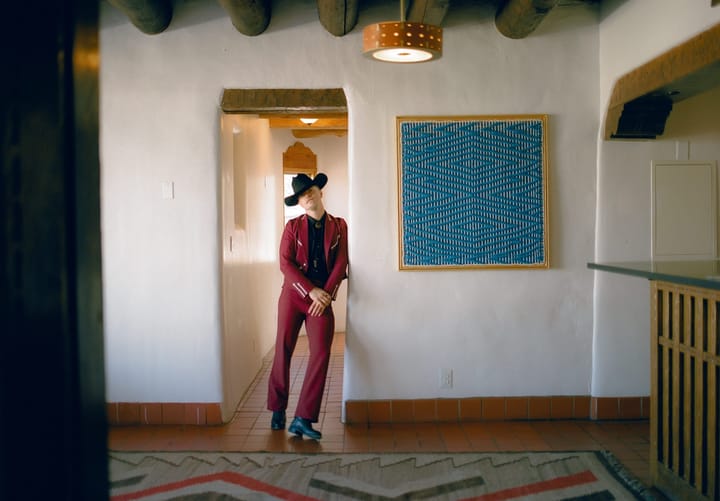"Initially, we really aimed ourselves toward trying almost to put ourselves in that Bill Monroe era -- intentionally pursued it. That was really fun, and we worked at it for a long time....But once we started letting other musical ideas and songs in, there was no stopping it, and I said, 'We have to keep doing this.'"
--Reid Burgess
Ever since the release of King Wilkie's debut disc Broke on Rebel Records three years ago, it has been very, very easy to encounter reviews and profiles celebrating the young band from Charlottesville, Virginia, for their energetic, back-to-basics approach to hard-driving, traditional bluegrass.
After all, aren't the boys named for Bill Monroe's horse? Don't they wear those dark, gentlemanly suits even in the middle of the summer, work a single mike with tight, late-'40s harmonies, stick to the classic instruments, and put the first-generation, genre-building songs up-front in their shows? Descriptions such as "the future of bluegrass" and "new kings of bluegrass" have been plastered on them -- as has, with considerably more serious consideration, the IBMA's Emerging Artist of the Year award in 2004.
Heady stuff. But from the standpoint of the six band members, the very nature of the praise was becoming troubling.
"In the first two years," recalls John McDonald, who ably carries the smoother half of King Wilkie's lead vocal load, "when we were out cranking the traditional bluegrass stuff, and playing covers written in that style, the most common comment made afterward would be from some older gentleman who'd come up to the table, stick his hand out, and say, 'Man, it means a lot to have young guys like you playing this music and showing respect for this music that I've loved all my life.' And that was great. Then, at the end of the conversation, they'd look you right in the eye and say, 'Keep doing what you're doing!' Which was cool, and made you feel really validated -- at the beginning."
If the well-intentioned gentlemen had been paying just a little closer attention, they could have noticed that there was also, from the very start, a certain amount of shaking of that traditional bluegrass framework going on.
Reid Burgess, the band's other, more gravelly, lead singer -- and, along with co-founder Ted Pitney, one of its central songwriters -- was already pointing out the occasional Neil Young harmonies and updated lyric themes on Broke when writer Danielle Dreilinger first profiled the band in these pages in July 2004. And Reid was emphasizing, even then, how the personal stories of the sextet inevitably set their resulting sounds apart, however tradition-oriented they'd worked to be.
The King Wilkie boys, coming from diverse musical backgrounds, had discovered the territory in a few intense, fruitful years after college, a story quite different from those of traditional bluegrassers who've spent a lifetime digesting the music, raised in its native style. Their original songwriting, more and more noticeably, came to reflect that difference -- and there were still those congratulating them for sticking to somebody else's knitting.
"Yeah; guys would still come up and say that same thing," McDonald reflects. "While I'd still appreciate it, I was also thinking, 'Hmm -- but did you really hear it?' So 'Just keep doin' what you're doin', son' started to feel a little claustrophobic."
As it happens, on the new King Wilkie CD Low Country Suite (released June 26 on Zoe/Rounder), there's no straightforward, traditional bluegrass to be heard, at all. All eleven songs are band-written originals, with very varied tones, often harmonious in non-traditional ways. At times they're in a very contemporary acoustic Americana mode, often reflecting the more rural end of late-'60s/early-'70s rock, with Byrds/Burritos/Band/Neil Young/Leonard Cohen influences showing. The sounds venture as far as Burgess' frisky "Ms. Peabody", played in sheer raccoon coat '20s vaudeville style -- one more example, apparently, of the lasting influence of "The Muppet Show" and "Sesame Street" vaudeville on contemporary music.
To produce Low Country Suite, King Wilkie chose Jim Scott, famed as the engineer on the Rick Rubin sessions with Johnny Cash, and for his engineering and producing work with everyone from the Red Hot Chili Peppers to Matthew Sweet, Tom Petty and the Dixie Chicks. Scott brought with him a grab-bag of additional instrumental sounds that appear on the recording -- a toy piano, that 19th-century autoharp-meets-hammered-dulcimer contraption the Marxophone, and even a few bits of percussion and electric guitar. Greg Leisz provides some pedal steel and slide guitar.
It's also notable that Low Country Suite finds the band jumping from the traditionalist Rebel Records label (which issued Broke in 2004) to the broad-ranging Rounder collective -- and the indie/edgy Zoe wing of Rounder at that (home of Kathleen Edwards, Cowboy Junkies and the Damnwells, among others).
King Wilkie's established fans -- even those who may have picked up on the earlier implied attraction to varied musical styles -- and newcomers who have heard only descriptions of their previous work are bound to be taken by surprise.
"This record does go to some very odd places and takes a lot of chances," Burgess agrees, "but a lot of that is just about making a second record. It would be impossible for this band to get the same kind of excitement for a second record as the first one, so we were kind of able to move around the drudgery of that by making a record that seemed like a first one."
Don't let that itch to keep things spanking-new fool you, though. No one would mistake King Wilkie's members for potential stars of Short Attention Span Theater. All six of them -- Burgess, on keyboards now as well as mandolin; McDonald, on guitar; Pitney, on lead guitar; Nick Reeb, on violin (formerly listed as "fiddle"); Abe Spear, on banjo; and Jake Hopping, previously with midwest jamgrassers the Spud Puppies, the newcomer on bass --spent years honing their traditional bluegrass knowledge and prowess. They had achieved growing acclaim for it, and forged their sense of themselves as a group in the process.
Pitney came in from jazz but also had been in rock bands, as had Burgess and McDonald. In addition, Pitney and Burgess had led what they tend to think of now as a "trying to sort of play bluegrass band" called Captain Catastrophe, before King Wilkie came together at Ohio's Kenyon College.
"And now," says Burgess, "we're sort of letting everything back in."
The decision to let that happen came in stages. The opening track, "The Raising Of The Patriarchs", co-written by Burgess and Pitney, is an example of a song that was transformed during the process. The band points with particular satisfaction to how it emerged as a reflective, spookily echoing ballad that speaks of, among other things, traveling a long way to find calm. To a create its setting, they had to rethink the very elements that would have been more or less a given had it felt appropriate for a bluegrass treatment.
"That was kind of a milestone for us, something really unique when it was complete" says Burgess. "It's funny, because I had that song two years before we recorded it, but it wasn't really working. So when, all of a sudden, we found a way to make it work, it was very satisfying.
"It started out very whispery, like a folk ballad with harmonies all the way through it; we were trying to spin it that way. It was just weak; the song didn't have balls. We'd always tried to get this 'one voice' harmony thing...but we figured out how to approach the phrasing and the harmonies so that it wasn't one voice. Instead of trying to melt together, Johnny and I both go do our own distinct thing.
"That came to us only after we'd done 'Wrecking Ball' and 'Angeline' -- doing those songs helped us connect the dots, "Reid continues, referring to two catchy, acoustic rocklike tracks on the album that could, in Americana terms, virtually be singles. "We'd found more of our own individual voices again -- and answered the question of where to put the bass notes....We didn't want the arrangement to fill everything in from the beginning."
Letting each song find its own way, outside the demands of any particular genre (like that choice of looser harmonies reminiscent of The Band, when needed), was, in real ways, a pretty gutsy departure from what had become King Wilkie's comfort zone.
"We'd all been speaking the same language, which made it easy to put songs together," McDonald recalls. "I mean, it wasn't easy technically; that part's hard. But it was cool to have a format to work in, parameters to make things a little easier, to work within."
"It's also tough writing bluegrass songs," Burgess adds. "You're forced to be creative, because there are these little limits and rules for working the genre. But for us, at least for me, it wasn't really personal enough."
And so, rather than writing songs like the Broke track "Lee & Paige" -- which is quite original in its own way (a young man grabs his girlfriend just in time to die with her as she's hit by a train) -- they've come up with songs in which jet planes go by, modern women present the love life complications, and the experiences raised in the stories are slightly more likely to have happened to them.
"It's hard writing about stuff that has never happened to you, ever," Burgess acknowledges, "unless you just work in the abstract, and I guess that's another way to go. Initially, we really aimed ourselves toward trying almost to put ourselves in that Bill Monroe era -- intentionally pursued it. That was really fun, and we worked at it for a long time. It was what we were doing best for a while. But once we started letting other musical ideas and songs in, there was no stopping it, and I said, 'We have to keep doing this.'"
And so, this one took a while to bring home. Low Country Suite has been, in effect, three years in the making; it's a considerable departure even from the limited-release EP Tierra Del Fuego that they put out themselves in 2005 as a sort of halfway stop between the two sounds. By now, the more freeform place outside of the band's practiced arena seems to its members like a new sort of comfort zone itself.
"For the most part, it seems now like there was a lot more anxiety with the first record, about arriving with precision at a sound; it was such a stylized thing," Burgess says. "Part of that, I'm sure, was also that we were quitting our jobs; this is not a hobby, so there was a lot of insecurity....Here, it was a lot more natural; we were just letting things come as they came. Not trying to be so cohesive."
This is a band made up of -- they all agree -- opinionated guys with "if it's this, it's not that" tendencies. Which is one reason they were initially attracted to the hard-defined, nothing-vague traditional bluegrass vein rather than the somewhat more flexible contemporary or newgrass subgenres to begin with. But that doesn't necessarily mean King Wilkie 2.0 is some final, locked version either.
"This is an evolution," McDonald says. "My favorite bands are those that evolve, with each album different -- Wilco, for example. I got really into their Being There album when I was in high school -- which was all over the map then, but each one of their records has been different, which is why they have been exciting to wait for."
And -- rather touchingly in an era when so many performers feel the need to underscore a new direction or sound by blasting their previous favorite -- King Wilkie has continued to include the bluegrass material in their live sets, even as they've slowly worked newer material into their old repertoire. They have only good things to say about the bluegrass scene, the festivals, most of the people, the life.
So far, they've been gratified to find much of their audience receptive to the move they've made. They also understand very well that others won't be so taken with it. But they know how basic the bluegrass discipline has been to their identity as a group.
"We have a lot of the same tastes, after all," McDonald says. "You won't hear a lot of flashy stuff now -- because we never were drawn to that. Everything we do today is still filtered through the band that we were when we were playing more traditional music. That's an absolute part of our DNA."
ND senior editor Barry Mazor is very fond of bluegrass. He is fond of a lot of other things, too.




Comments ()